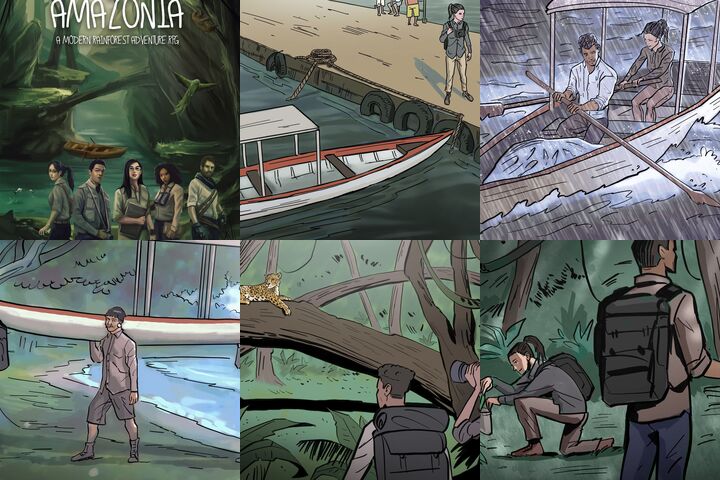Amazonia Video Game
The Problem
Deforestation in the Brazillian Amazon has increased by 279% since March 2019 according to a report published by Imazon. Nearly 50% of that deforestation is occurring in settlements, conservation units, and indigenous lands. This deforestation in the Brazillian Amazon is primarily driven by beef production to supply the demand of Brazil’s beef market itself. We are choosing to approach this problem from the angle of the supermarket and restaurant consumer, as well as the voter. If a large enough market for deforestation-free beef and beef alternatives emerges; there will be greater economic incentive for conscientious farmers to invest into systems to access that market, thus creating a feedback loop that could grow the sector to significant market share over time. This process is called market nudging. Also, if more voters are aware of the issues at hand and how their politics affects these issues they will be more inclined to vote for environmentally-minded local candidates and candidates will be inclined to incorporate environmentalism into their policies. Trying to change the entire economic and political landscape of Brazil in a drastic way is extremely naive wishful thinking, however attempting to nudge the markets and outlooks of Brazillians, as well as international consumers worldwide, is less so if we are clever about targeting and humble about the scale of impact by seeing ourselves as one of many players in the fight to save the Amazon rainforest.
Our Proposal
We will partner with a Brazilian rainforest conservation organization to develop a delightful educational video game (in Portuguese) that is set in the Amazon rainforest, and is designed with behavior-change principles in mind, aimed to nudge the Brazillian consumer’s buying habits towards deforestation-free beef and beef alternatives, thus increasing that market share [Rare and The Behavioural Insights Team. (2019)]. By sticking to a small city in which our Brazilian partners are established, we can partner with a spectrum of restaurants, schools, and community organizations to get our game into the hands of players and create a community around it. The game will also be supported by an educational suite for teachers and professors. To track efficacy, we will track local beef markets to understand if our video game is meeting our behavior change goals. Amazonia is a modern scientifically and sociologically accurate adventure game where the player will become one of several characters - a biologist, journalist, or environmental engineer - and set off on character-specific missions to save the Amazon rainforest. Throughout these missions, players will experience the richness of the rainforest, along with the conflict and ethical dilemmas associated with its protection, and in the game they'll build the ecologically sustainable Amazon of the future!
We Assume that...
We can find a Brazilian conservation organization that is willing to consult with us during the early stages of game development.
We will be able to enter the Brazilian gaming market.
Restauranteurs, educators, conservationists, and activists will want to work with us to get the game out into the community
Deforestation-free beef and beef-alternative market providers (large-scale suppliers, restaurants, local farms) will be accessible and we can connect to them within our provided virtual spaces.
Constraints to Overcome
By partnering with a Brazilian NGO and working at a local level we can have a fast feedback loop between the game's designs, the local market's realities, and the cultural context. We'll be able to maximize our chances of success with each design decision as it will be objective and relevant. We will carefully address the creative problem of creating an educational video game that properly incorporates best-practices of behavioral science, effective education, and game design by making use of professional consultants in each area. Our business will be sustainable as we are creating a product whose sales can go beyond the context in which it is designed. Our game will be an entertaining one for all players. The gaming market of Brazil is sizable and there is opportunity to enter it as indie game developers. Additionally, we will leverage the passion of conservationists, activists, and educators to spread the word of our game and go viral.
Current Work
Primary Teaming Task: Partner with an appropriate Brazilian conservation organization that will contribute conceptually to the development of the game, help us get in contact with local businesses in a selected city, and eventually be open to assisting us with trial runs. Game-Dev Tasks 1. Complete story-boarding of first missions for the three primary game characters. 2. Hire artists to develop in-game assets 3. Hire artists to develop visual scaffolding for first levels 4. Program beta version of first three levels (one for each character) 5. Run a beta version for the game
Current Needs
1. We will reach out to, consult with, and partner with an appropriate Brazilian conservation organization. 2. We will consult several wildlife conservation professionals to ensure the accuracy of our game. 3. We will consult with educational game development experts to ensure we make the best creative decisions possible.
